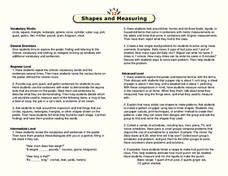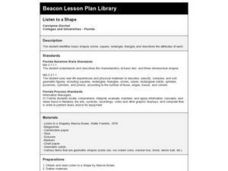Curated OER
How Many Ice Creams?
Young scholars discuss their favorite ice cream flavors and read the math problem. They brainstorm the problem and brainstorm for ways to solve the problem. Students work in pairs and share solutions.
Curated OER
Ice Cream Pictograph
Learners create a graph. In this pictograph lesson, students cut out 20 small ice cream cones and decorate them. Learners create a pictograph with their ice cream cones.
Curated OER
Pop Art Ice Cream Painting
Students develop skills in painting and create a painting of an ice cream cone using Pop Art as in inspiration.
Curated OER
Pop Art Ice Cream Painting
Students create paintings of ice cream treats using Pop Art as an inspiration while developing skills in painting in this 4th through 6th grade Art lesson. Included with the lesson are possible extensions and suggested evaluation rubric.
Houghton Mifflin Harcourt
Shapes and Measuring
Youngsters develop mathematical vocabulary with this worksheet. First, give youngsters time to identify their vocabulary words in the picture provided. Then, as a group, practice saying the vocabulary words aloud. Finally, have learners...
Curated OER
Double Dipping
Fifth graders find and display all possible pairs of flavors of ice cream and look for patterns in the results. They discuss strategies for finding all combinations of flavors. Students explain and write a description for the pattern...
Curated OER
Imaginative Picture Writing
Students create a book about clouds after the teacher reads the book, "It Looked Like Split Milk".
Curated OER
Icky Sticky Fingers
Practice recognizing the short vowel /i/ in written and spoken language. Introduce the target sound with a fun tongue twister about Lizzy the lizard. Through matching and listening activities, learners discriminate the vowel sound /i/...
Curated OER
Concept Attainment Model: Volume and Surface Area
Using a concept attainment approach, learners identify surface area and volume by sorting examples (photos) that depict each concept (positive) from those that don't (negative). Then as a class, they develop definitions of each...
Curated OER
Why We Save
Young scholars discover how to save money. In this financial planning lesson, students read the story Spend or Save? and discuss ways to save money. Young scholars choose a character from the story and write about a financial decision...
Curated OER
It's Icky Icky Sticky
Students recognize the short vowel i in written and spoken language. Through listening and matching activities, they discriminate the vowel sound /i/ from other phonemes. Students identify the phoneme and letter in pseudo words they decode.
Curated OER
Mmm Mmm Good!
Students recognize the phoneme /m/. Through matching and listening activities, students discriminate the phoneme /m/ from similar looking letters and phonemes. They associate the phoneme /m/ with its letter representation and identify...
Curated OER
Listen to a Shape
First graders identify basic shapes (circle, square, rectangle, triangle) and describes the attributes of each. They use magazines to find examples of each shape, and then make a collage.
Curated OER
Minting a New Mint
Students explore why the Founding Fathers felt it was necessary to have a solitary form of money used throughout the land. Students create their own money systems and have a class sale to simulate the confusion of multiple forms of...













